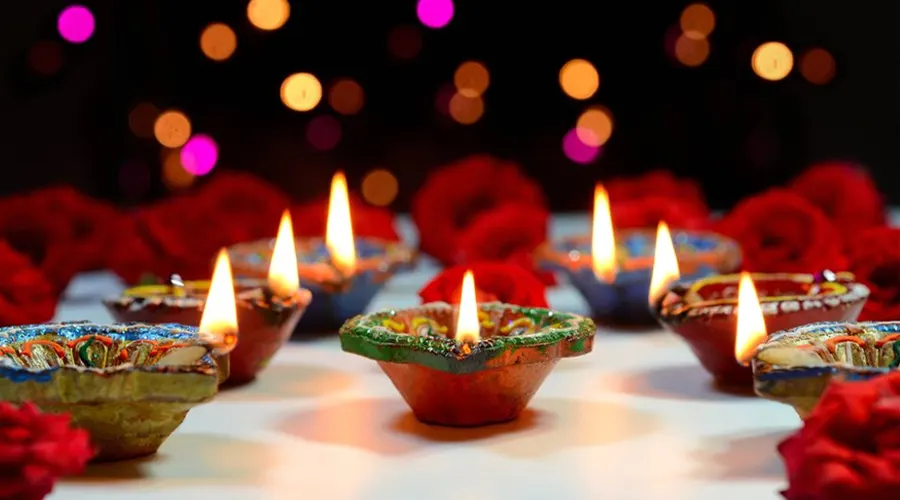Diwali - The Festival of Lights also called Deepawali
Diwali the festival of lights is India's most awaited and brightest of all festivals. As per the Hindu calendar, Diwali is observed on Amavasya (or new moon) - the 15th day - of the month of Kartik, every year, and comes somewhere around late October to mid-November every year.
Diwali 2021 is on November 04, Thursday
The 2021 Diwali celebration starts with Dhanteras on November 02, 2021, Tuesday, and ends with Bhai Dooj on November 06, 2021, Saturday.
Diwali Calendar 2021 - The 5 days of Diwali 2021
|
Day 1 |
Dhanteras |
November 02, Tuesday |
|
Day 2 |
Naraka Chaturdasi (Chotti Diwali) |
November 03, Wednesday |
|
Day 3 |
Lakshmi Puja (Diwali Festival) |
November 04, Thursday |
|
Day 4 |
Govardhan Puja |
November 05, Friday |
|
Day 5 |
Bhai Dooj |
November 06, Saturday |
Diwali illuminates our houses and hearts and preaches the message of friendship and togetherness. Light is the depiction of hope, success, knowledge, and fortune and Diwali reinforces our faith in these virtues of life.
RITUALS OF DIWALI
Diwali is celebrated in different forms all across India and this is an important National holiday too.
Diwali celebration continues for 5 days. Day one starts with Dhanteras the beginning of a new financial year. The second day is Naraka Chaturdashi is also known as Chotti Diwali, the day Lord Krishna killed the demon Narakasura. Then the next day that is the third dau is Amavasya, the day Goddess Lashmi, the deity of wealth and fortune is worshipped and this day is Diwali. The fourth day is Govardhan Puja and the last day is celebrated as Bhai Dooj, the day sisters worship their brothers and pray for their life and well-being.
On Diwali people wear new clothes and worship Goddess Lakshmi and Lord Ganesha. This day is dedicated to the Special Lakshmi Puja. Feasting, gambling, exchanging gifts among friends and families, and bursting crackers are a must during Diwali.
HISTORY OF DIWALI
The beauty of Diwali is that it is not limited to the celebration of just one historical event. Each religion and each zone remembers different stories and historical events behind it.
Hindus honor the return of their religious deities Sita and Rama to Ayodhya, following an exile of 14 years. The day when Goddess Mother Durga destroyed the demon Mahisha is also celebrated. The festival of lights also honors the seventh incarnation of Lord Vishnu in the form of Ramachandra.
Sikhs also celebrate the release of their sixth guru, Hargobind Singh, from prison in 1619. Remarkably, the foundation stone of the holiest place for Sikhs, the Golden Temple of Amritsar, was embedded in 1577 on Diwali.
For Jains, Lord Mahavira, the founder of their religion, called Jainism, reached the state of Nirvana or Moksha on the occasion of Diwali.
In Southern India, Diwali marks the homecoming of their ancient King Mahabali and people decorate their houses with flowers and cow dung to welcome the King. Govardhan Puja is done on this day.
In Bengal and other parts of Eastern India, Goddess Kali is worshipped on this day. This is known as Shyama Puja.
In Maharashtra, Diwali starts with the worshipping of cows and their calves. This is known as Vasu Baras.
Regardless of the events or religion surrounding it, Diwali brings with it happy tidings and a promise of a better tomorrow. People zealously light lamps in their houses and throw grand feasts to celebrate happiness, good times, and good fortune. Purity, cleanliness, and brightness are all synonymous with Diwali. The new harvest and new financial year in the business community also begin on this occasion.
Big Diwali fairs are held across the country. These fairs are centers of business and many artists and acrobats are seen performing in these events.


Comments (0)